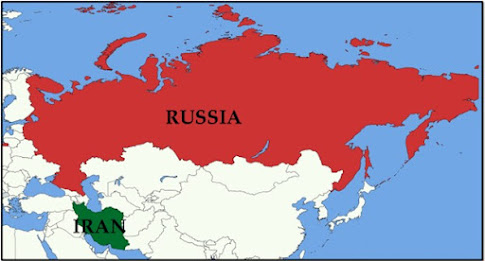Russia's reliance on Iran for critical military supplies, a country long under international sanctions, highlights a seismic shift in geopolitical power dynamics and signifies the waning influence of what was once a formidable military superpower.
In
the bleak winter of early 2024, a clandestine transfer materialized, marking a
significant geopolitical shift. Iran, a nation long perceived as an armaments
importer, commenced the shipment of 400 "highly accurate" ballistic
missiles to Russia. This momentous action not only realigns the military
dynamics between these two US-sanctioned powers but also signals a profound
transition in Russia's geopolitical stature.
The
arsenal, primarily from the Fateh-110 family, includes the Zolfaghar missiles,
capable of striking targets between 186 to 435 miles away. This shipment,
initiated in January 2024 following agreements in Tehran and Moscow, represents
a startling reversal in the traditional arms supply chain. Sources close to
Reuters unveiled that these deliveries, made both by air and via the Caspian
Sea, are merely the beginning of a more extensive collaboration.
An
Iranian military official, maintaining anonymity, confirmed the occurrence of
at least four shipments, with promises of more to come. The brazen statement,
"There is no reason to hide it. We are allowed to export weapons to any
country that we wish to," encapsulates Tehran's newfound confidence in its
military manufacturing capabilities. This boldness is further cemented by the
silence from Iran’s defence ministry and the Revolutionary Guards, who
traditionally oversee the country's ballistic missile program.
Russia's
reception of these missiles, while unacknowledged by its defence ministry,
signifies a stark deviation from its historical role as a global arms exporter.
The limitations on Iran's export of military technology, once dictated by the
UN Security Council, expired in October, paving the way for such transactions,
despite ongoing US and EU sanctions.
The
West, particularly the United States, has expressed grave concerns. John Kirby,
the White House national security spokesman, forewarned in early January about
Russia's imminent acquisition of short-range ballistic weapons from Iran and
North Korea. This transaction not only challenges the global arms balance but
also raises alarms about the proliferation of advanced weaponry to conflict
zones and sanctioned states.
The
expansion of Iran-Russia defence cooperation became more evident with Moscow's
incursion into Ukraine in February 2022. Tehran’s Shahed drones have played a
crucial role in Russia's long-range assaults on Ukrainian cities and
infrastructure. The addition of the Fateh-110 family missiles and the
Zolfaghar, deemed precision weapons by experts like Jeffrey Lewis of the
Middlebury Institute of International Studies at Monterey, intensifies the
threat. These 400 munitions possess the potential to inflict substantial
damage, augmenting the already brutal Russian bombardment.
This
current development where Russia, historically a dominant force in global arms
trade, finds itself in a position of reliance on Iran for military support,
unveils a dramatic shift in the landscape of international military power. This
dependence is not just a mere strategic adjustment but a glaring indication of
the depletion in Russia's own arsenal. The relentless conflict in Ukraine has
not only drained Russia's military resources but has also exposed
vulnerabilities in its once formidable military-industrial complex. The very
act of seeking armaments from Iran, a nation more known for its role as an arms
importer than a supplier, is a stark testament to the significant erosion of
Russia's self-sufficiency in arms production. This situation points to a deeper
crisis within Russia's defense capabilities, suggesting a severe strain on its
ability to sustain prolonged military engagements.
Moreover,
the geopolitical ramifications of this dependence are significant and
far-reaching. Russia's turn towards Iran, a nation itself battling the weight
of international sanctions and economic challenges, marks a pivotal change in
global power equations. This alliance reflects not only Russia's growing
international isolation but also its strategic pivot towards engaging with
non-traditional, even controversial, allies. Such a move is indicative of a
desperate bid to retain its influence and military strength. It unveils a
Russia that is increasingly cornered, seeking support wherever it can be found,
regardless of the diplomatic cost. This shift underscores a profound decline in
Russia's global stature, moving from a position of strength and autonomy to one
of dependence and vulnerability. The choice of Iran as a military ally
highlights Russia's diminishing options on the international stage, painting a
picture of a once-great power now grappling with diminishing influence and
options.
The
import of Iranian missiles by Russia transcends the bounds of a simple arms
transaction. It symbolizes a significant realignment in the balance of global
power, indicating a momentous shift in the international order. The image of a
once-mighty Russia, now reliant on Iran for critical military supplies, signals
a notable reduction in its global presence and influence. This development
could very well be the harbinger of the waning days of President Putin's
long-standing reign, marking a potential end to an era. It reflects a broader
narrative of a fading empire, one that is struggling to maintain its grip
amidst a rapidly evolving and increasingly challenging geopolitical landscape.
In this context, the Iranian missile shipment to Russia is more than just a
military aid package; it represents a profound statement about the changing
tides of international power and the decline of a once-dominant global player.
As
the world witnesses this unexpected turn in military alliances, it becomes
increasingly apparent that the mighty Russia, as we knew it, is indeed falling.
The reliance on Iranian weaponry is not just a tactical shift but a stark
symbol of a diminished giant, grappling with the realities of its waning
influence and power.





No comments:
Post a Comment